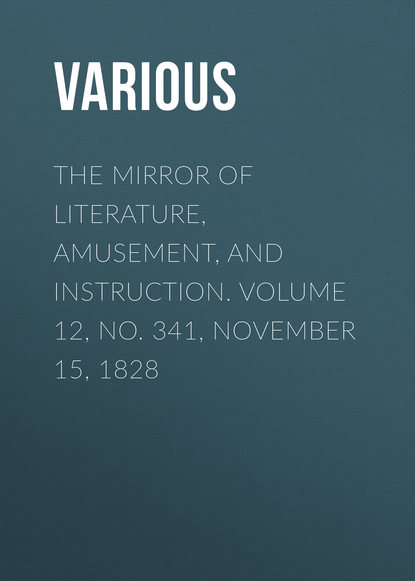По всем вопросам обращайтесь на: info@litportal.ru
(©) 2003-2024.
✖
The Mirror of Literature, Amusement, and Instruction. Volume 12, No. 341, November 15, 1828
Автор
Год написания книги
2018
Настройки чтения
Размер шрифта
Высота строк
Поля
By a Student of the University of Dublin.
Cum ita semper me amares,
How to reward you all my care is,
Consilium tibi do imprimis
For I believe that short my time is;
Amice Admodum amande,
Pray thee leave off thy drinking brandy,
Video qua sorte jaceo hic,
'Tis all for that, O sick! O sick!
Mors mea, vexat matrem piam,
No dog was e'er so sick as I am.
Secundo mi amice bone,
My breeches take, but there's no money,
Et vestes etiam tibi dentur,
If such old things to wear you'll venture;
Pediculos si potes pellas,
But they are sometimes prince's fellows;
Accipe libros etiam musam,
If I had lived I ne'er had used them,
Spero quod his contentus eris,
For I've a friend almost as dear is,
Vale ne plus tibi detur.
But send her up, Jack, if you meet her.
C.K.W.
OLD ST. PAUL'S
In the old cathedral of St. Paul, walks were laid out for merchants, as in the Royal Exchange. Thus, "the south alley for usurye, and poperye; the north for simony and the horse fair; in the middest for all kinds of bargains, meetings, brawlings, murthers, conspiracies; and the font for ordinary paiements of money, are so well knowne to all menne as the beggar knows his dishe."
THE LINCOLNSHIRE EEL,
A bit of Munchausen
In the year 1702, there was a universal complaint among the feeders of cattle in the fens, that they frequently lost a horse, an ox, or a cow, and could not discover by what means; when watching more narrowly, they observed a horse, and presently after a cow, go to the river to drink, and suddenly disappear. On going to the river-side they saw an eel, the body of which was as large as an elephant. They could not doubt but this was the thief who had so often robbed them of their cattle, and they very reasonably concluded if they could catch the eel, their cattle would henceforth drink in safety. A council being called among the farmers, they determined upon the following expedient:—They sent to London and purchased a cable and anchor, by way of fishing-line and hook, and roasted a young bullock, with which they baited the hook, and fastened the end of the cable round a barn, which stood about a hundred feet from the river, and then waited to see what the morning would produce. At break of day they repaired to the riverside, when, to their great astonishment, they found that the eel had been there and swallowed the bait, but in endeavouring to disengage himself, had pulled the barn after him into the river, and having broken the cable, made his escape.
With the present is published a SUPPLEMENTARY NUMBER, containing the SPIRIT of "the ANNUALS" for 1829—with Critical Notices of their Engravings and Literary Contents, copious Selections, and Unique Extracts, and a FINE ENGRAVING from a splendid subject; in one of the most popular of these elegant works.
LIMBIRD'S EDITION OF THE FOLLOWING NOVELS ARE ALREADY PUBLISHED:
notes
1
Dr. Stukely, who says, that acan in the Chaldee signifies a serpent, and hac is no other than a snake. In Yorkshire they still call snakes hags; and in the British language pen denotes a head.
2
The only place in which they do not progress mutually is the theatre. Look at the scenery of our patent theatres, and compare it with the vulgar daubs even of John Kemble's time. Some of the scenes by Stanfield, Roberts, Grieve, and Pugh, are "perfect pictures." Yet the language of the stage is at a stand, and insipid comedy, dull tragedy, and stupid farce are more abundant than before the "march of mind".
3
While on the subject of wood-engraving, perhaps we may he allowed to mention our own humble plan of illustrating a sheet of letter-press for twopence. Of course, perfection in the engraving department would have ruined all parties concerned; for each of our subjects (as the miniature painters tell you of their works) might be worked up to "any price". It is now six years since the MIRROR was commenced, and as we are not speaking of ourselves, individually, we hope we may refer to the progressive improvement of the graphic department without any charge of vanity.
4
The engraving is from Prout's exquisite picture of the magnificent city of Vicenza—for which we recollect our obligation to the "Forget Me Not."











